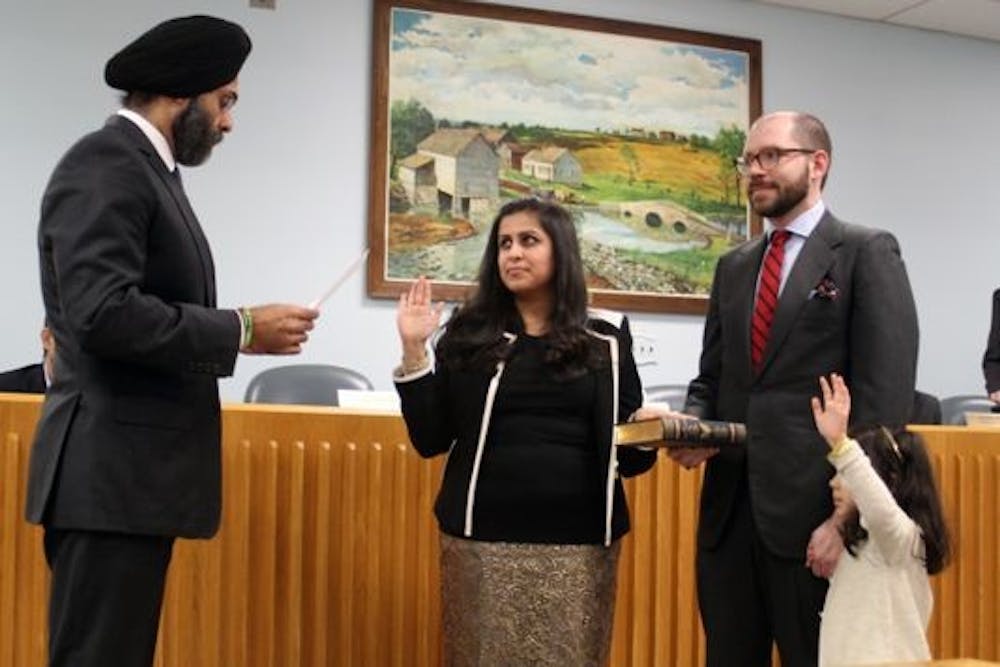On Thursday, Jan. 3, Sadaf Jaffer became New Jersey’s first South Asian woman — and the United States’ first Pakistani-American woman — to serve as a mayor.
A scholar of South Asian, Islamic, and gender studies, Jaffer will continue to work as a postdoctoral research associate at the Princeton Institute for International and Regional Studies while serving as mayor of Montgomery, N.J.
She is currently working on a book about perspectives on Islam in India through the lens of Ismat Chughtai, an Urdu writer and cultural critic.
Jaffer received her undergraduate degree from the Walsh School of Foreign Service at Georgetown University. She began her studies there in 2001. But, barely a month into her first year, the Sept. 11, 2001, attacks shook the United States.
“Before 9/11, most people were simply ignorant about Islam,” Jaffer said. “But after it, the popular conversation about Islam became plagued with misinformation.”
In part motivated by that cultural shift, Jaffer sought out courses dealing with the history of Muslim societies in the Arab world. She quickly discovered a passion for the subject, leading her to spend her junior year studying at the American University in Cairo.
Upon her return to the United States, Jaffer realized something troubling: At Georgetown and across academia as a whole, there was a dearth of research on Islamic and South Asian history. She took it upon herself to change that.
After two years studying Urdu in India, Jaffer pursued a Ph.D. in the Indo-Muslim culture program at Harvard’s Department of Near Eastern Languages and Civilizations.

There, she met Daniel Sheffield, now an assistant Professor in the University’s Near Eastern Studies department. They married in 2011.
Jaffer then completed a postdoctoral fellowship in Global Studies at Stanford University.
Shortly afterwards, she and Sheffield moved to Montgomery Township, N.J., and became passionate about local government there.
“When we first moved to Montgomery,” Sheffield said, “it was a town in which the local government was all white and Republican. But we quickly realized it was a diverse community with large East Asian, South Asian, and Hispanic populations. We didn’t see any representation for them in local government.”

Disappointed by the contrast between Montgomery’s residents and its elected officials, Jaffer quickly became involved in local government. She was selected to be in the inaugural class of Emerge New Jersey, a training program for Democratic women leaders.
After losing her first race as a write-in candidate, she appeared on the ballot the next year and won a spot on the township committee.
Only a year later, she became mayor.
“Things move fast,” Jaffer said with a laugh.
To residents of Montgomery Township, her leadership — only 10 days in — has come as a welcome change.
“As we’ve been going out into town recently,” Sheffield said, “we keep getting stopped by people who are commenting on how proud they are that Sadaf was elected, and how happy they are to see South Asian representation at the level of the local government.”
However, reception to Jaffer — and to Montgomery’s diversity — was not always positive.
Just weeks into her township committee role, Montgomery was the scene of an anti-Muslim bias crime — someone left pork on a Muslim family’s car.
As debate ensued about the severity of the incident, Jaffer’s academic expertise proved instrumental. She provided a wealth of research to the township committee and to her constituents about Islamophobia and the history of using pork to target Muslims.
Her ability to turn the distressing incident into a learning experience for the community was emblematic of her personality, according to deputy mayor Catherine Gural. To Gural’s mind, Jaffer’s career as an educator and a lecturer makes her uniquely qualified to foster civic engagement and unity.
“I’ve never seen Sadaf upset,” Gural said. “In the midst of her own campaign, she had negative mailers sent out about her, and a number of her lawn signs were destroyed and thrown into the woods. She maintained her composure, remained rational, measured, and thoughtful. She does a great job of bringing disparate groups together, creating an environment where everyone can participate and learn.”
To Jaffer, her mission is bigger than her own accomplishments.
Her roles as an academic, a politician, and an activist complement each other. Not only does she want to accurately represent her district, but she wants to show those around her that public service does not have to come at the expense of a career.
“When our systems of government were formed, the assumption was that people would only serve for a few years,” she said. “I think it would be great if more academics — and more people of all backgrounds — would consider running for office.”
And Jaffer is already succeeding in inspiring those around her, like Montgomery resident Sukaina Ali.
“The community showed that Montgomery is not a ‘melting pot’ but a ‘salad bowl’ where diversity is encouraged and individuality is valued,” Ali said. “To me, as a South Asian female, it inspires me to excel in my field and gives hope that hard work does pay off.”








